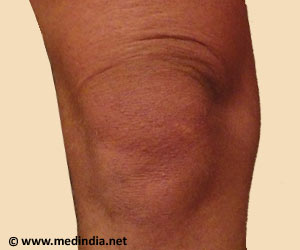A study by researchers from Hospital for Special Surgery reveals that a natural tissue graft can spur regeneration of cartilage and improve symptoms in patients who have cartilage damage in their knee.

"The results at this time are encouraging," said lead author of the study Scott Rodeo, M.D., orthopedic surgeon and co-chief of the sports medicine and shoulder service at Hospital for Special Surgery, in New York City. "De Novo NT compares favorably to our existing techniques, given that it is easy to do and involves a one step procedure. We are cautiously optimistic. It clearly regenerates tissue, but we need further long-term followup."
The smooth, white tissue covering the ends of bones where they come together to form joints is called articular cartilage. In the knee, this cartilage can be damaged by a traumatic sports accident, a bad fall, or normal wear and tear in active individuals. Articular cartilage lesions can cause pain and lead to osteoarthritis. "Articular cartilage injuries to the knee are fairly common, and they are hard to treat," said Dr. Rodeo. "Cartilage has no capacity to heal spontaneously, and cartilage lesions over time can get progressively larger."
There are no perfect options for treating articular cartilage lesions, but current therapeutic approaches include surgeries such as microfracture, a procedure that involves drilling small holes in bones to induce bleeding and spark healing. Surgeons can also use donor tissue that can be sized and fitted to the defect, but donor tissue is in limited supply and reestablishing congruity of the cartilage surface using this method can be difficult.
De Novo NT is an FDA approved cartilage repair technique. The product is made out of minced cartilage from organ donors under the age of 13. Unlike cartilage in adults, this young tissue has a high proliferative capacity. Cells from the transplanted cartilage escape or migrate into surrounding area tissues, multiply, and form a new cartilage tissue matrix that integrates with the surrounding host tissue. This technique eliminates the need for harvesting and requires less suturing because the product uses a fibrin sealant to secure the particulated tissue pieces into the lesion. Fibrin is an insoluble "sticky" protein involved in the clotting of blood.
"The small pieces of juvenile cartilage are less than a millimeter in size, and what happens is the cells can migrate out of these small pieces of cartilage," said Dr. Rodeo. "We are trying to take advantage of the high proliferative capacity of the tissue."
Advertisement
In the study presented at the AOSSM meeting, clinicians used De Novo NT to treat 17 patients who had cartilage damage on the kneecap (specifically focal patellofemoral cartilage lesions). The average lesion size was 203 millimeters. Clinicians compared symptom assessment survey data and MRI images at baseline and at two years of followup and identified improvements in all patients.
Advertisement
The patients also showed improvements on MRI scans, with traditional MRI technology as well as quantitative T2 mapping MRI. T2 mapping, which evaluates biochemical changes in the cartilage, was developed by HSS investigators including Hollis Potter, M.D., chief of the division of magnetic resonance imaging, director of research in the Department of Radiology and Imaging at HSS. T2 mapping in 6 patients showed prolongation of quantitative T2 values in both the superficial (58.6 vs. 37.4; P=0.02) and deep components of the repair tissue (47.18 vs. 28.3; P=0.005), demonstrating that the tissue still differs from normal cartilage.
"Quantitative MRI, when combined with morphologic assessment, allows us to understand the natural history of repair techniques," said Dr. Potter, who was also involved with the study presented at AOSSM. "We gain knowledge about the biology of integration with the host tissue, as well as the repair tissue biochemistry (collagen orientation), all by a noninvasive imaging technique."
Adverse events seen in patients, such as swelling and inflammation, were typical postoperative complications seen after other cartilage repair strategies.
"Using symptom outcome scales, we have demonstrated symptomatic improvement, and we have used MRI to carefully evaluate the regenerative tissue," said Dr. Rodeo, who pointed out longer followup is needed. "We need to perform MRIs on a yearly basis to follow the maturation of the tissue."
De Novo NT Natural Tissue Graft is manufactured by Zimmer Incorporated.
Other researchers from Hospital for Special Surgery involved in the study are Cecilia Pascual-Garrido, M.D., Stephanie L. Gold, M.S., Jaclyn Snikeris B.S., Alissa Burge, M.D., Joseph Nguyen, MPH, Russell F. Warren, M.D., and Riley J. Williams, M.D.
About Hospital for Special Surgery
Founded in 1863, Hospital for Special Surgery (HSS) is a world leader in orthopedics, rheumatology and rehabilitation. HSS is nationally ranked No. 1 in orthopedics, No. 3 in rheumatology, No. 10 in neurology and No. 5 in geriatrics by U.S. News & World Report (2012-13), and is the first hospital in New York State to receive Magnet Recognition for Excellence in Nursing Service from the American Nurses Credentialing Center three consecutive times. HSS has one of the lowest infection rates in the country. From 2007 to 2011, HSS has been a recipient of the HealthGrades Joint Replacement Excellence Award. HSS is a member of the NewYork-Presbyterian Healthcare System and an affiliate of Weill Cornell Medical College and as such all Hospital for Special Surgery medical staff are faculty of Weill Cornell. The hospital''s research division is internationally recognized as a leader in the investigation of musculoskeletal and autoimmune diseases. Hospital for Special Surgery is located in New York City and online at www.hss.edu.
Source-Newswise









